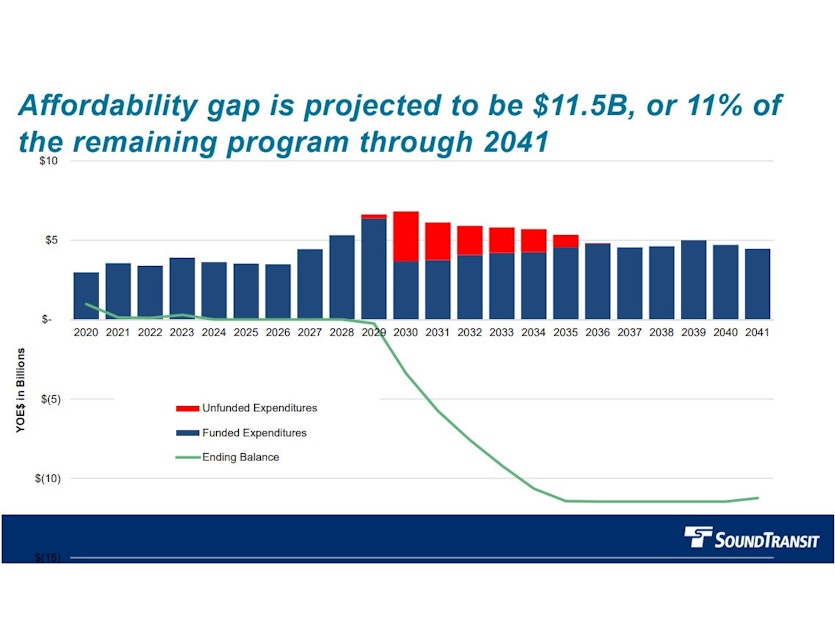Sound Transit optimistic after first week of Biden administration

Sound Transit is financially stable in the short term, but faces significant long term fallout 10 years from now due to the Covid-19 recession and rising land costs.
Still, the first few days of the Biden administration have the transit agency's leaders smiling a little more often.
After Joe Biden’s first week in office, light rail fans in the greater Seattle area have reason for optimism.
It comes after bad news for Sound Transit, which is building out a light rail system linking Everett, Tacoma, Seattle, and Bellevue.
The Bad News
Earlier this month, analysts at Sound Transit sounded the alarm: In 2030, the agency's budget would fall off a cliff.
In the short term, the agency is fine. New rail stations set to open in the next few years will be completed on time and under budget.
Sponsored
The problem is that sales tax revenue has declined dramatically during the Covid recession, even as land costs have risen relentlessly. Today, those effects feel as subtle to Sound Transit as the flapping of a butterfly’s wings. In 2030, the long-term effects of the Covid recession will suddenly reach hurricane status.
The 2030 crisis was summed up in a chart (below) presented at a Sound Transit board workshop Thursday. Board Chair Kent Keel told the presenter “I’ve sat through things like this at the executive level over my 40 years, and I’ve never seen a chart where the budget dropped off the chart like you showed us. I’ve never seen that. So that’s pretty sobering for me. And I thought it was an error, but as you kept talking, uh, it’s pretty sobering.”

The result of this crisis is that Sound Transit will have to do one of three things:
- Take longer to do the things that Sound Transit promised voters to do in its ST3 ballot measure.
- Scale back the scope: doing fewer things than Sound Transit promised voters to do.
- Find more money, somehow.
Sponsored
This is the background to understand how much was at stake on Thursday as Sound Transit officials carefully watched the confirmation hearings of President Biden's pick for Transportation Secretary, Pete Buttigieg.
Reasons for Optimism
The day started promisingly, with Washington Senator Maria Cantwell, a Democrat, poised to take over control of the committee as soon as Democrats and Republicans in the Senate finalize their power-sharing agreement.
In addressing Buttigieg, Cantwell made clear her personal priorities: “Projects like Sound Transit are facing a $1 billion shortfall from Covid-19, which jeopardizes the much-needed investment throughout Puget Sound.”
Later, Buttigieg spoke of a “generational opportunity to transform and improve America’s infrastructure.”
Sponsored
Among those watching the confirmation hearing was Peter Rogoff, the CEO of Sound Transit.
He tuned in closely because, after a long career working in the Senate, and later for President Obama, this is what he was hired to do: manage projects, sure, but also, bring home the bacon.
During the Trump administration, that meant working closely with Washington’s congressional delegation to ensure things did not go as badly as they could have. In fact, they went quite well, with Sound Transit becoming the largest recipient of loans granted through the Transportation Infrastructure Finance and Innovation Act.
While that earlier success means Sound Transit might not be first in line for those loans in the future, Rogoff ended a presentation to his board Thursday with two main reasons for optimism.
First, there’s the fact that the U.S. is joining the Paris Climate Accord.
Sponsored
And second, there’s the Biden's administration’s interest in green jobs. When Senator Ted Cruz used Buttigieg’s confirmation hearing to criticize Biden’s cancellation of the Keystone XL Pipeline, which Cruz said would kill jobs, Buttigieg said those lost jobs would be replaced by many, many more green jobs.
Back in Seattle, Peter Rogoff told his board: all those things point to Sound Transit.
“If you’re really trying to achieve the emission goals of the Paris Climate Accord and you’re trying to grow more jobs on climate friendly projects, it’s really hard to identify folks other than Sound Transit, and a few others, that are ready to step up and do that,” he said. “That’s the case we’ll be making to our [congressional] delegation and to the new leadership in DC.”
It’s unlikely that the shift in power to a more transit-friendly political party will resolve all of Sound Transit’s financial problems. The recession’s impact is simply too large. There will likely still be hard decisions to make, locally. Some of them may hurt.
That difficult process, called “realignment,” will take much of 2021, and will involve working not just with the federal government, but with state government as well, which holds a great deal of power over Sound Transit’s income and costs.
Sponsored
But after the first few days of the new Biden administration, Sound Transit’s Peter Rogoff is smiling.

